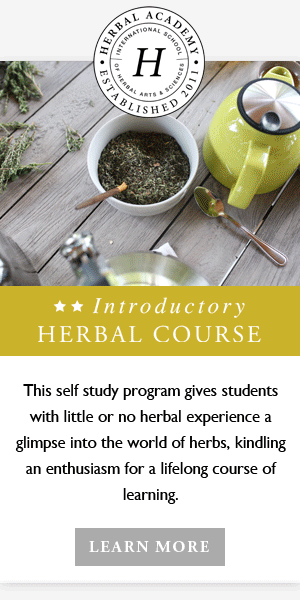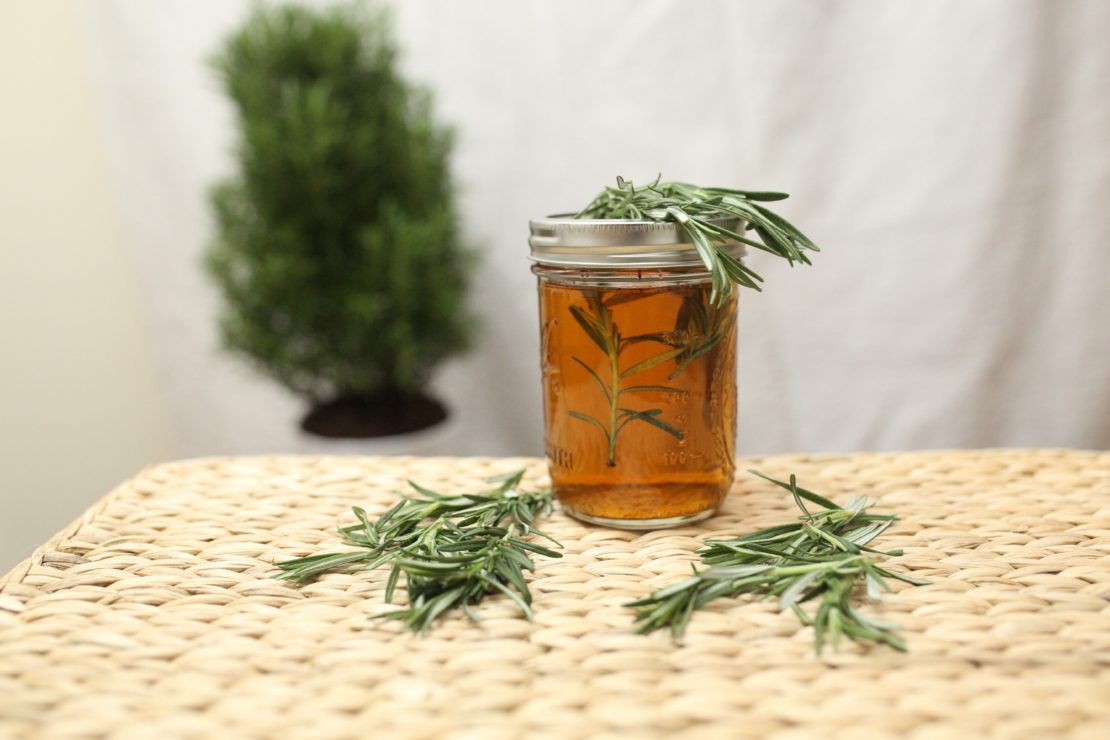
Our Favorite Herbs to Help You Get Your Study On (Plus, a DIY Memory Tonic Tea Recipe!)
It’s back to school season, and that means kids and adults are gearing up for another year of learning.
Here at the Herbal Academy, we, too, are in the midst of back to school season. Whether you’re new to herbalism or you’ve been practicing for a while, we’d love to have you join us in one our our herbal courses this year.
In today’s article, we’d like to share some of our favorite memory herbs with you that you can incorporate into your daily routine to help you cope with stress, stay focused, and calm your mind during this hectic season. We’d also like to share a recipe for an herbal memory tonic tea as well.
13 Study Herbs For Back To School Season
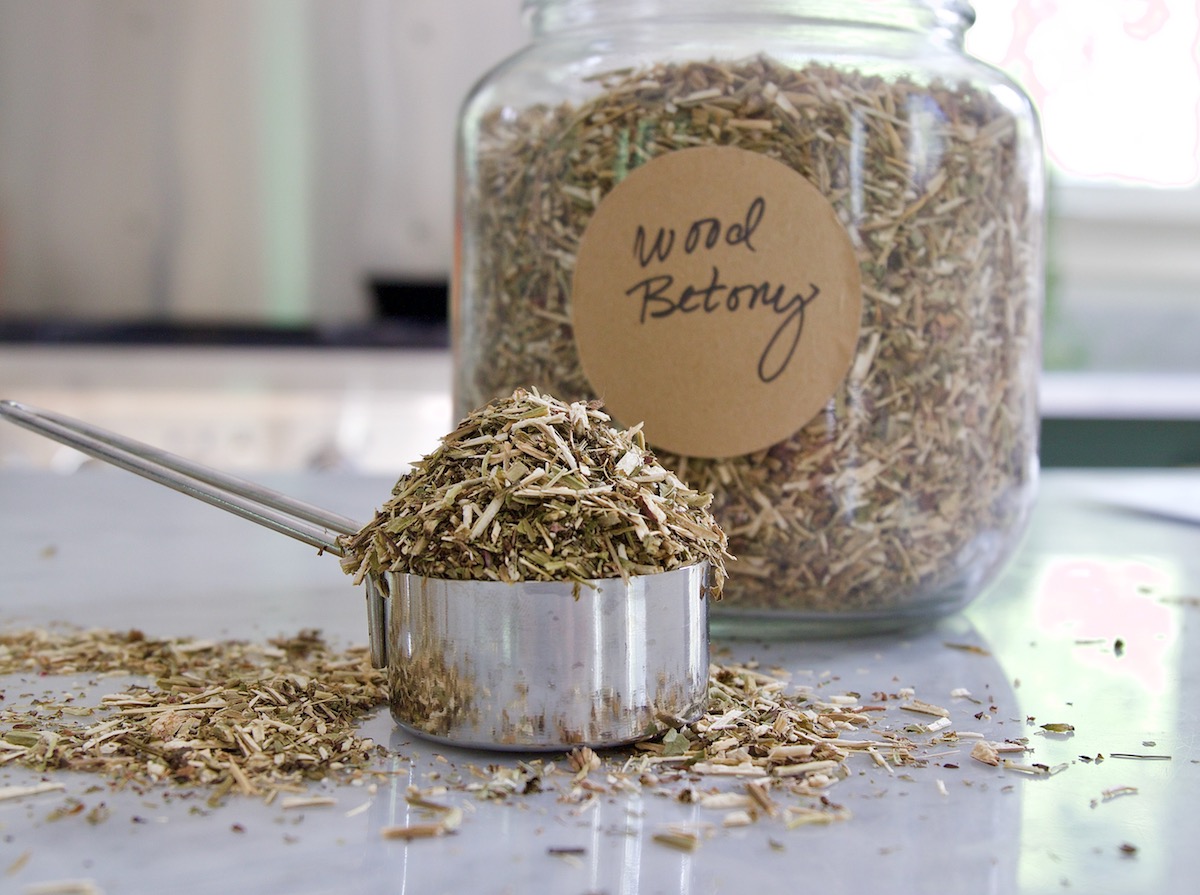
Brain Tonics
Brain tonics are plants that have specific actions that directly affect the body systems associated with the brain, particularly the nervous and cardiovascular systems. These herbs are specifically indicated for various brain-related conditions, and over time, work to promote overall brain health and function.
Gotu kola (Centella asiatica) leaf
Gotu kola is an Ayurvedic herb that has been used as a brain tonic for over 2,000 years (Groves, 2016). It is a cooling, slightly drying herb (Tierra, 1980) that is said to balance all doshas (Frawley & Lad, 1986). It has a wide range of actions in many body systems, but its actions in the nervous, endocrine, and cardiovascular systems are what make this herb a great ally for brain health. Gotu kola improves vascular tone and protects against cardiovascular disease (Lininger et al., 2000). It also increases neuronal branching and improves free radical scavenging activity, resulting in a reduction in oxidative stress and damage, making it helpful for improving cognition and memory (Caldecott, 2006; Khalsa, 2008, cited in Walsh, 2014). Lastly, it also improves the body’s ability to use glucose, the brain’s primary fuel, when blood sugar levels are low (Groves, 2016).
Bacopa (Bacopa monnieri)
Bacopa is an Ayurvedic herb that helps to increase cognitive function, specifically in regards to improving memory recall and ability to focus (Groves, 2016). Research indicates that bacopa may also support healthy mental function as we age (Aguiar & Borowski, 2013; Kongkeaw et al., 2014). It has effects on multiple body systems, but its action on the nervous and cardiovascular systems in particular, are what has made this herb a notable brain tonic. Bacopa’s most widely accepted mechanisms of action are its modulation of neurotransmitters (Mathew et al., 2010; Rastogi et al., 2012) and its ability to scavenge free radicals (Aguiar & Borowski, 2013). It may also impact cognition by increasing cerebral blood flow (Kongkeaw et al., 2014) and prevent neuronal damage and reducing neuroinflammation (Rastogi et al., 2012). Most benefits are seen when bacopa is used for 12 weeks or longer (Stough et al., 2013).
Wood betony (Stachys officinalis)
Wood betony is a nervine that gently tones and strengthens the nervous system while relaxing it at the same time (Hoffmann, n.d.). According to Ayurveda, wood betony helps to balance vata constitutions (Stauber, 2016; Frawley & Lad, 1986). Traditionally, this plant has been used for a variety of head-related conditions, such as head injuries, concussions, strokes, vertigo, memory loss, migraines, tension headaches, sinus headaches, and even toothaches (Katz, 2016; Wood, 1997), and is believed to “promote cerebral circulation, open the arterial blood supply, and to reduce high blood pressure” (Wood, 1997). While wood betony’s actions, specifically for head-related conditions, is common in traditional and modern uses, very little scientific research has been done on this plant.

Memory Enhancers
While some herbs work in a general way to support the wellness and function of the brain, such as the brain tonics discussed above, other herbs work in specific ways to enhance memory. Many of the plants in the mint family, such as those discussed below, do just this.
Rosemary (Rosmarinus officinalis) leaf
Rosemary may be one of the most well-known “brain herbs” used today. It has been shown to improve the speed of memory recall in the elderly when used in what herbalist Maria Noel Groves calls “seasoning” doses, which are around 750 mg of rosemary (Groves, 2016). Its effects on the cardiovascular system are believed to increase mental function and acuity by stimulating circulation and increasing blood flow to the brain (Berger, 1998). Rosemary’s stimulating action also has other benefits to the brain as well, and it is used as a folk remedy for anxiety, depression, insomnia, lethargy, nervousness, fatigue, exhaustion, stress, headaches, and migraines (McIntyre, 1996). Energetically, rosemary is a warming, drying, stimulating, and restorative herb (Holmes, 1997).
Peppermint (Mentha x piperita) leaf
The aroma of peppermint has been shown to improve alertness, memory recall, and reaction time (Groves, 2016) and is an excellent support when someone needs a boost of physical and mental energy. In fact, the Latin name mente means “thought,” indicating that the Romans regarded peppermint for its effect on the mind (McIntyre, 1996). Peppermint’s brain-supportive actions are, like many of the herbs previously discussed, in part due to the plant’s effects on the nervous and cardiovascular systems. As a nervine, peppermint is both relaxing (calms anxiety and eases tension) and stimulating (used to wake up or to recharge vital energy). Its cardiovascular benefits are due to its ability to dilate blood vessels and stimulate circulation, increasing blood flow throughout the body (Pedersen, 2011).
Sage (Salvia officinalis) leaf
In herbal folk traditions, sage has historically been used as an herb that increases wisdom—such as giving a person the title of a “wise sage.” In the sixteenth century, John Gerard noted sage’s affinity for the head and the brain, remarking that sage quickened the senses and memory (Grieve, 1971). Modern research has revealed several things about sage’s ability to enhance cognition. First, research suggests that compounds in sage act on the muscarinic and nicotinic cholinergic systems that are involved in cognition and memory processes (Miroddi et al., 2014). Second, sage inhibits acetylcholinesterase (AChE, the enzyme that breaks down acetylcholine) and helps improve memory recall as well as improves mood and overall cognition (Groves, 2016). In fact, modern studies have found that a single dose of sage extract or dried leaf is capable of increasing memory capacity and improving mood (Miroddi et al., 2014), but it doesn’t always have to be taken internally as the aroma of sage can even help to promote mental alertness (Mars, 2007). Lastly, sage has been shown to inhibit lipid peroxidation—a biomarker of oxidative stress and damage—in the brain, therefore, it protects brain tissue and also acts as an antioxidant that promotes the scavenging of free radicals as well (Oboh & Henle, 2009).
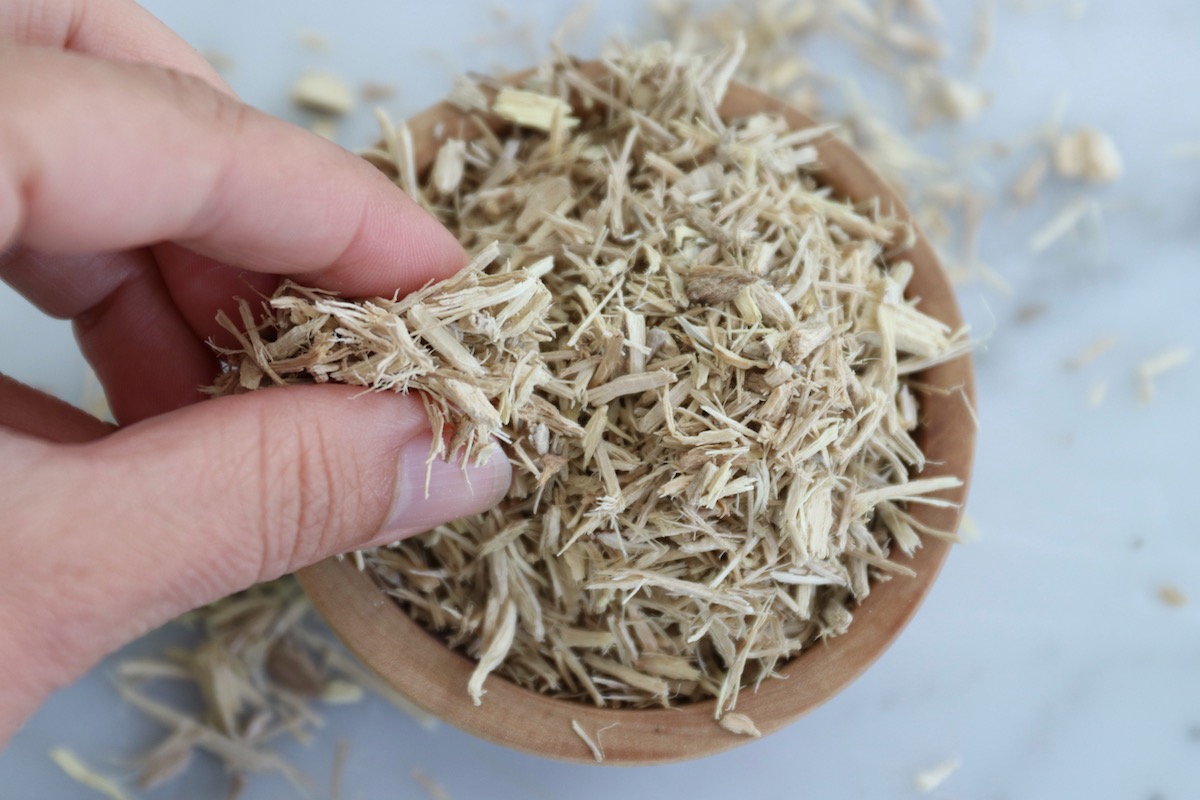
Adaptogens
Adaptogens are herbs that work to increase the body’s ability to resist and cope with stress, including physical, mental, or emotional stressors, allowing the body to adapt and respond to stress instead of succumbing to it (Winston & Maimes, 2007). Because stress can negatively impact brain function, these herbs are a great addition when brain support is needed.
Eleuthero (Eleutherococcus senticosus) root
Eleuthero, a member of the ginseng family, is often referred to as the king of adaptogens! When it comes to this herbs support on brain wellness and function, its supportive effects lie in the root’s actions on the endocrine and cardiovascular systems. Germany’s Commission E (their equivalent of the United State’s Food and Drug Administration (FDA)) approved eleuthero as a tonic for invigorating and fortifying the body during times of fatigue or declining capacity for work and concentration (American Botanical Council, 2007), and several clinical studies have even indicated eleuthero’s ability to alleviate mental fatigue and improve concentration and memory in human subjects (Panossian & Wikman, 2009). According to herbalist Matthew Wood, eleuthero also improves blood circulation and cardiovascular health (Wood, 2008)—two things that help to support brain function.
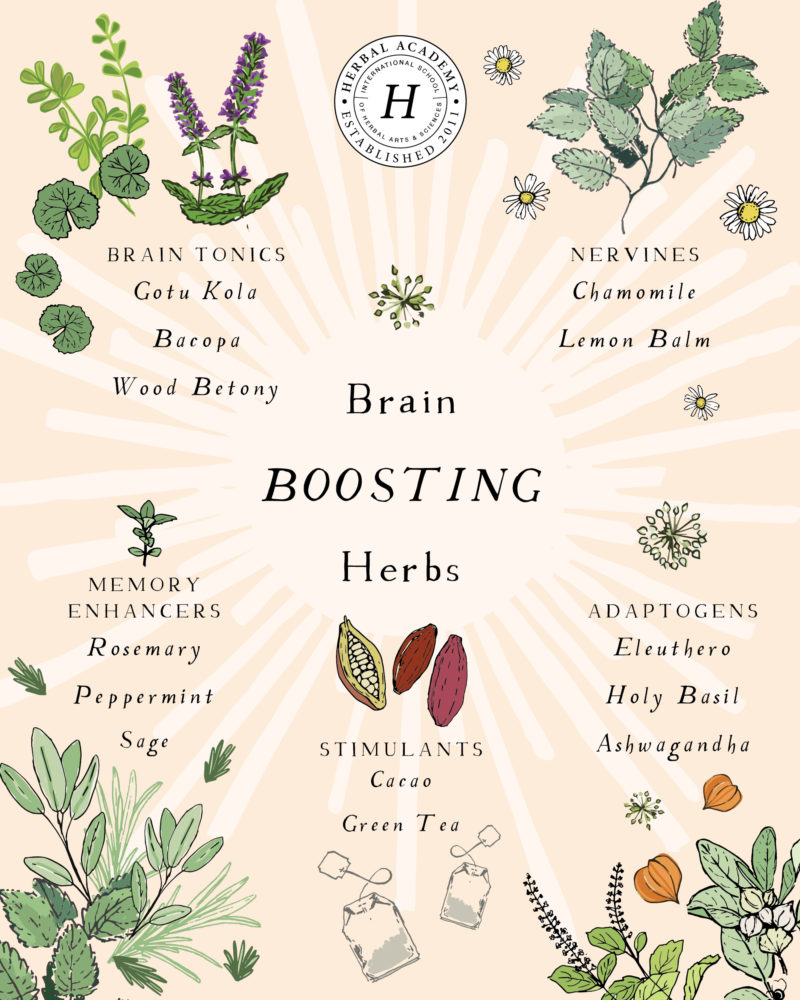
Holy basil (Ocimum tenuiflorum) leaf
Holy basil’s primary brain supportive actions occur in the endocrine, nervous, and cardiovascular systems of the body, and it is used by some herbalists to support memory and focus (Winston & Maimes, 2007). It has a dual action that is both stimulating and relaxing to the brain, depending on what is needed, and therefore, works to bring about a state of balance in the body. In the endocrine system, holy basil works as an adaptogen helping the body to respond well to stressors, which reduces the negative effects of stress on one’s physical and emotional health. In the nervous system, holy basil works to regulate the nervous system through its opening action, helping to move blocked energy and dispeling sluggishness as well as moving and directing restless energy to ease hyperactivity and inability to concentrate (Altman, 2014). In the cardiovascular system, holy basil enhances healthy circulation by slightly thinning the blood and stimulating circulation, increasing cerebral circulation and reducing cardiovascular stress both physically and via its adaptogenic actions (Herbal Academy, n.d.). All of these actions combined make holy basil a great herb to support the brain.
Ashwagandha (Withania somnifera) root
Ashwagandha is quite different than most of its stimulating adaptogen comrades in that it is a rather calming root, making it a great ally to nervous and high-strung individuals. Its actions work to soothe, nourish, and strengthen both the endocrine and nervous systems (Groves, 2016), thus supporting the wellness and function of the brain. In a 2009 randomized, placebo-controlled study on anxiety, patients taking a standardized ashwagandha preparation experienced significantly lower levels of anxiety than patients receiving psychotherapy and placebo, and significant differences in mental health, concentration, fatigue, social functioning, vitality, and overall quality of life were noted in the ashwagandha group as well (Cooley et al., 2009).

Nervines
Nervines are a group of herbs that help to nourish, soothe, and strengthen the nervous system, which can help to revitalize neurotransmitter and nerve function, thus benefiting brain health (Groves, 2016).
Chamomile (Matricaria chamomilla) flower
Chamomile is a potent anti-inflammatory herb and powerful nervine which makes it a wonderful ally for anyone with nervous disorders, particularly when used fresh as the volatile oils are most intact in this form (Wood, 2008). Commonly used to ease anxiety and tension, clinical trials have shown chamomile to provide significant anxiolytic effects in patients with mild to moderate generalized anxiety disorder (Amsterdam et al., 2009) and may even provide antidepressant activity as well (Amsterdam et al., 2012). Chamomile also helps to ease emotional symptoms when used regularly (Sharifi et al., 2014) and also is beneficial for those who experience anger and inflammation when under stress (Wood, 2008).
Lemon balm (Melissa officinalis) leaf
Best known for its nervine properties, lemon balm is sometimes referred to as a nervous system trophorestorative (Hoffmann, 2003), which indicates that over time, it helps to tonify and repair the nervous system. It also has mild anti-depressive properties and is beneficial in improving mood (Hoffmann, 2003). It also has mild a tonic effect on the cardiovascular system, improving circulation by helping to dilate blood vessels (Hoffmann, 2003). Lemon balm is also a great ally for healthy brain function as it improves the ability of acetylcholine, a neurotransmitter that plays an important role in memory and learning and often declines as we age, to effectively transmit synaptic messages onto the tissues in the brain (Britannica, n.d.; Groves, 2016).
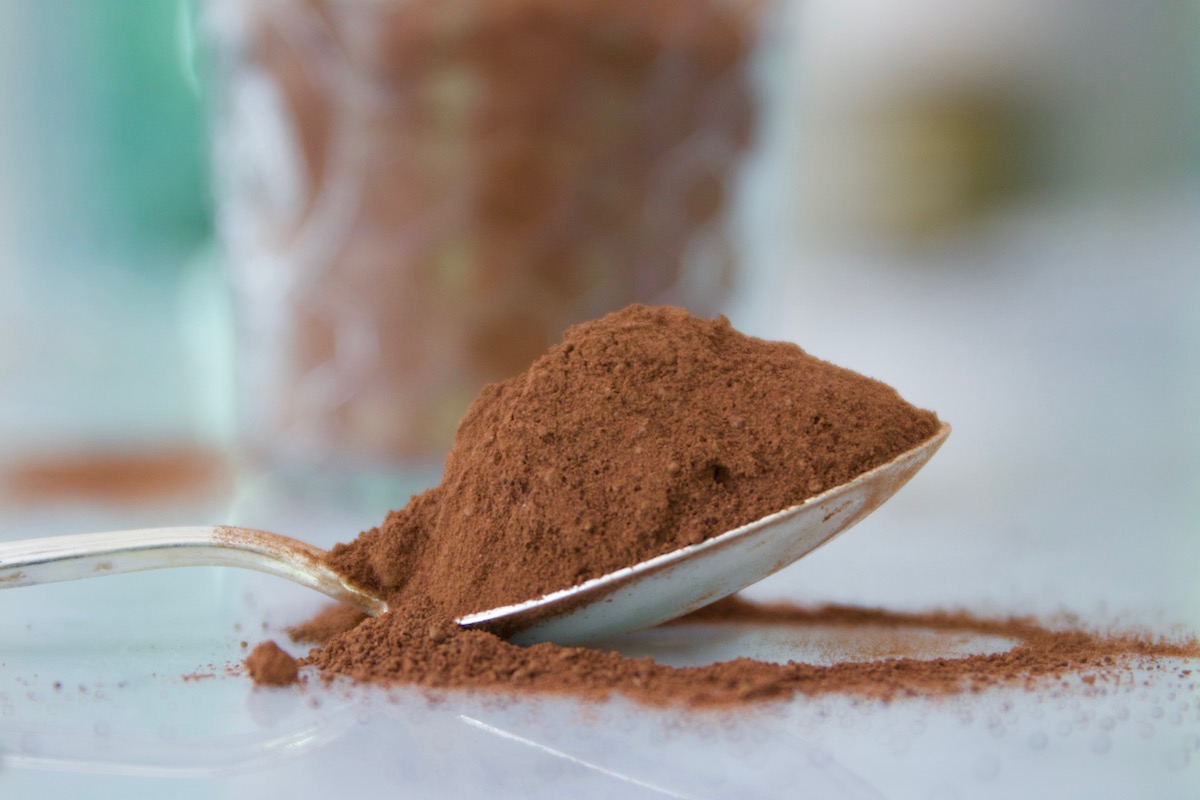
Stimulants
Stimulants are substances that raise the level of physiological or nervous activity in the body, and many plants contain chemical constituents that have stimulant actions. Most of these substances have a direct stimulating effect on the nervous and cardiovascular systems, but sometimes directly affect the respiratory, urinary, and other body systems as well (Hoffmann, 2003).
Green tea (Camellia sinensis) leaf
Tea contains caffeine, theobromine, and theophylline—all chemicals that are stimulating to the nervous and cardiovascular systems (Hoffmann, 2003). Green tea, with its antioxidant effects, has been shown to reduce the risk of age-related cognitive impairment and is also thought to help increase brain activity, memory, and focus by improving how well one area of the brain communicates with another (Groves, 2016).
Cacao (Theobroma cacao) fruit
Cacao contains several chemicals that are believed to affect the brain in a variety of ways. The first of these chemicals are caffeine and theobromine—both of which are nervous system and cardiovascular system stimulants that are found in varying amounts in chocolate and are believed to work synergistically (Hoffmann, 2003; Hughes, 2014). Cacao also contains a couple of other non-stimulating chemicals that have a direct impact on brain function. Among these are phenylethylamine (PEA), a neuromodulator of brain synapses that plays an important role in mood modulation as well as cannabinoid-like fatty acids that play some role in the cannabinoid system of the brain (Hughes, 2014).
A Memory Tonic Tea Recipe for Your Next Study Session
The herbs in this recipe are brain tonic herbs that are great for supporting healthy brain function. Not only do they help to relax the nervous system so you can focus (Altman, 2014; Sinadinos, 2008), but they stimulate the circulatory system so you get plenty of good blood flow to your brain (Herbal Academy, n.d.). In addition to this, they specifically work to improve memory recall, mood, and concentration (Groves, 2016)—all things you need in your corner when you are studying! This tea is a great blend to enjoy just before sitting down to study or read.
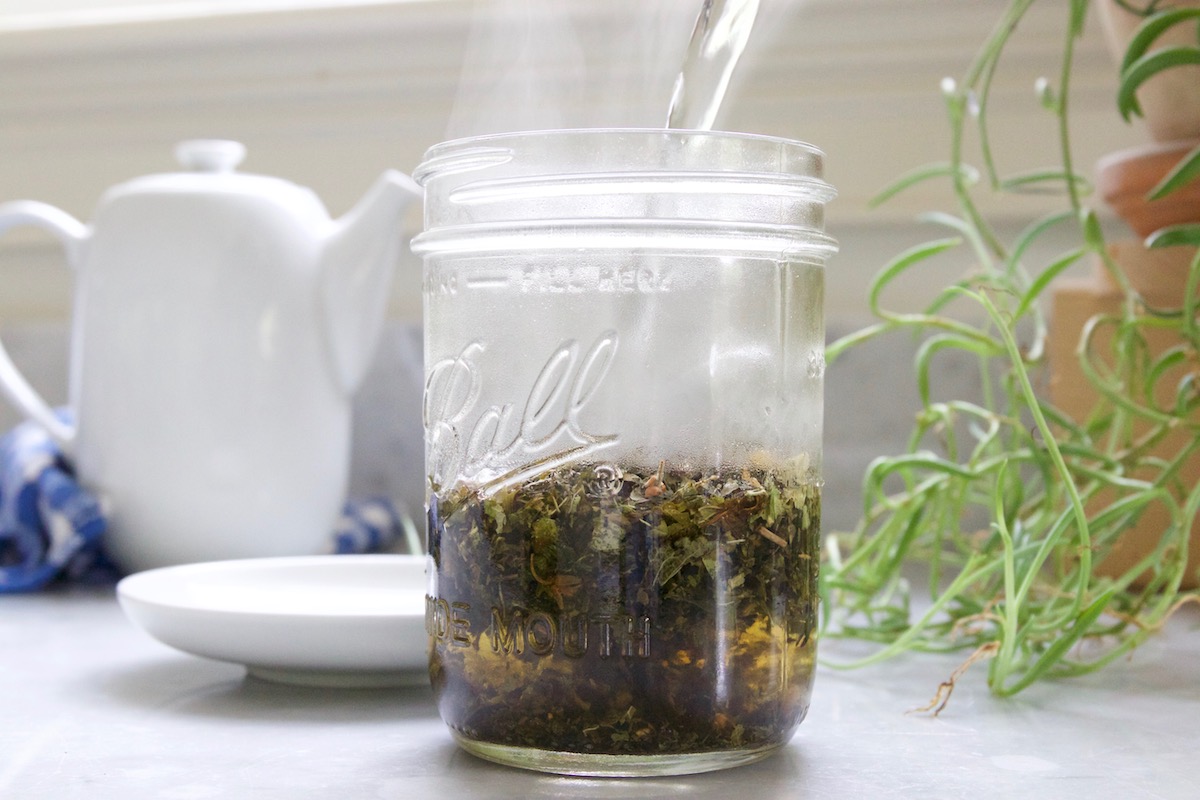

Minty Brain Tonic Tea
Enjoy a cup of this brain tonic tea the next time you need to study. With its nervous system and cardiovascular system benefits, it’s sure to support healthy brain function and help you make the most of your next study session!
2 tablespoons spearmint (Mentha spicata) leaf
1 tablespoon holy basil (Ocimum tenuiflorum) leaf
2 teaspoons sage (Salvia officinalis) leaf
- Bring water to a boil in a kettle or pot.
- While the water is heating, place your herbs in a pint-sized glass canning jar.
- As soon as your water comes to a boil, remove it from heat. When it stops boiling, pour hot water over the herbs.
- Cover the jar with a lid to prevent volatile oils from escaping with the steam.
- Steep for 5-20 minutes. The longer you let it steep, the stronger it will taste!
- Filter the herbs using a tea strainer into another clean pint-sized glass canning jar. Press down on the herb(s) with a spoon to squeeze out as much liquid as possible.
- Sweeten as desired, and drink 1-2 cups of tea 20-30 minutes before studying to stimulate the senses and increase blood flow to the brain!
For more recipes along this line, download our FREE 11 Herbal Recipes for Memory and Focus ebook!
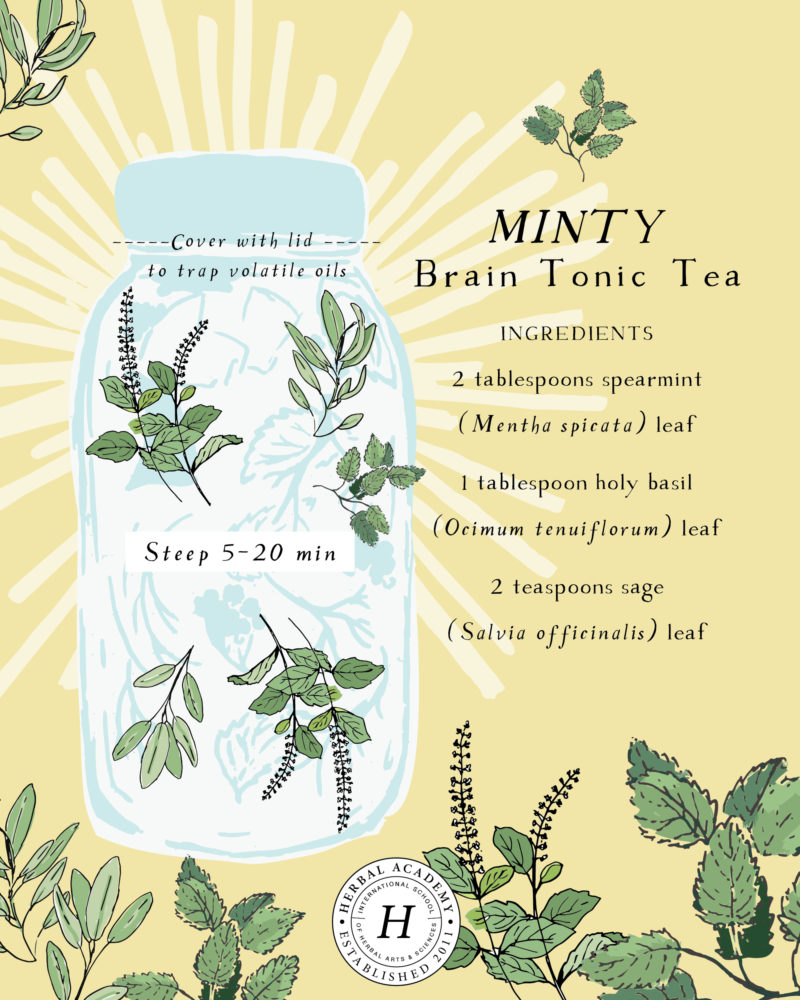
Are You Ready To Go Back To School To Learn About Herbs?
If so, check out our online herbal courses! Whether you are looking into herbalism as a hobby or personal endeavor or preparing for a career, we have herbal courses and packages to suit your path and your educational needs!
Our popular Herbalist Path Packages—the Family Herbalist Path, the Professional Herbalist Path, the Entrepreneur Herbalist Path, and the Clinical Herbalist Path—set you on the path you desire to walk! These packages bundle multiple programs together at a discount, saving you money on your enrollment.
If you’re looking for a course that meets you where you are, perhaps our Foundational Herbal Courses are for you. We set an herbal foundation in the Introductory Herbal Course, explore herbs in greater depth in the Intermediate Herbal Course, prepare for business endeavors in the Entrepreneur Herbal Course, and delve into complex clinical topics in the Advanced Herbal Course.
Not sure which of our Foundational Herbal Courses is a fit for you? Check out our Course Comparison Chart here.
We even offer topic-specific Short Courses, such as our Herbal Materia Medica Course, Botany & Wildcrafting Course, The Craft of Herbal Fermentation Course, Herbal Self-Care for Stress Management Course, and our newest, Botanical Skin Care Course!
Click here to check out all of our online herbal courses in one place!
REFERENCES
Aguiar, S., & Borowski, T. (2013). Neuropharmacological review of the nootropic herb Bacopa monnieri. Rejuvenation research, 16(4), 313-326.
Altman, R. (2014). Basil: Ocimum spp. Retrieved from http://www.kingsroadapothecary.com/pages/basil.
American Botanical Council. (2007). The Commission E monographs: Eleuthero (Siberian Ginseng) root. Retrieved from http://cms.herbalgram.org/commissione/Monographs/Monograph0092.html
Amsterdam, J.D., Li, Y., Soeller, I., Rockwell, K., Mao, J.J., Shults, J. (2009). A randomized, double-blind, placebo-controlled trial of oral Matricaria recutita (chamomile) extract therapy for generalized anxiety disorder. Journal of Clinical Pharmacology, 29(4), 378–382.
Amsterdam, J.D., Shults, J., Soeller, I., Mao, J.J., Rockwell, K., Newberg, A.B. (2012). Chamomile (Matricaria recutita) may provide antidepressant activity in anxious, depressed humans: An exploratory study. Alternative Therapies in Health and Medicine, 18(5), 44-49.
Berger, J.L. (1998). Herbal rituals. New York, NY: St. Martin’s Press.
Britannica.com. (n.d.). Acetylcholine. Retrieved from https://www.britannica.com/science/acetylcholine
Caldecott, T. (2006). Ayurveda: The divine science of life. New York, NY: Elsevier.
Cooley, K., Szczurko, O., Perri, D., Mills, E.J., Bernhardt, B., Zhou, Q., and Seely, D. (2009). Naturopathic care for anxiety: A randomized controlled trial ISRCTN78958974. PLoS One, 4(8), e6628.
Frawley, D., & Lad, V. (1986). The yoga of herbs: An Ayurvedic guide to herbal medicine. Twin Lakes, WI: Lotus Press.
Grieve, M. (1971). A modern herbal (Vol. 2). New York, NY: Dover Publications.
Groves, M.N. (2016). Body into balance: An herbal guide to holistic self-care. North Adams, MA: Story Publishing.
Herbal Academy. (n.d.). Holy basil herbal monograph. Retrieved from https://herbarium.theherbalacademy.com/monographs/#/monograph/3045
Hughes, K. (2014). Our chemical love affair with chocolate. Retrieved from https://herbarium.theherbalacademy.com/2014/11/our-chemical-love-affair-with-chocolate/
Hoffmann, D. (2003). Medical herbalism. Rochester, VT: Healing Arts Press.
Hoffmann, D. (n.d.) Wood betony: Herbal medicine materia medica. Retrieved from http://www.healthy.net/scr/mmedica.aspx?MTId=1&Id=302
Holmes, P. (1997). The energetics of Western herbs (Vol. 1). Boulder, CO: Snow Lotus Press.
Katz, N.J. (2016). Wood betony clinical uses. Natural Herbal Living, June 2016, 27-29.
Khalsa, K.P (2008). The way of ayurvedic herbs: A contemporary introduction and useful manual for the world’s oldest healing system. Twin Lakes, WI: Lotus Press.
Kongkeaw, C., Dilokthornsakul, P., Thanarangsarit, P., Limpeanchob, N., & Scholfield, C.N. (2014). Meta-analysis of randomized controlled trials on cognitive effects of Bacopa monnieri extract. Journal of Ethnopharmacology, 151(1), 528-535.
Lininger, S.W., Gaby, A.R., Batz, F. Austin, S., & Brown, D.J. (2000). Clinical essentials: Science-based reference of complementary and alternative medicine. Portland, OR: Healthnotes.
Mathew, J., Paul, J., Nandhu, M.S., & Paulose, C.S. (2010). Bacopa monnieri and Bacoside-A for ameliorating epilepsy associated behavioral deficits. Fitoterapia, 81(5), 315-322.
Mars, B. (2007). The desktop guide to herbal medicine. Laguna Beach, CA: Basic Health Publications, Inc.
McIntyre, A. (1996). Flower power. New York, NY: Henry Holt and Company, Inc.
Miroddi, M., Navarra, M., Quattropani, M. C., Calapai, F., Gangemi, S. & Calapai, G. (2014). Systematic review of clinical trials assessing pharmacological properties of salvia species on memory, cognitive impairment and Alzheimer’s disease. CNS Neuroscience & Therapeutics, 20, 485–495.
Oboh, G., & Henle, T. (2009). Antioxidant and inhibitory effects of aqueous extracts of Salvia officinalis leaves on pro-oxidant-induced lipid peroxidation in brain and liver in vitro. The Journal of Medicinal Food, 12(1), 77-84.
Panossian A., & Wikman G. (2009). Evidence-based efficacy of adaptogens in fatigue, and molecular mechanisms related to their stress-protective activity. Current Clinical Pharmacology, 4(3), 198-219.
Pedersen, M. (2011). Nutritional herbology. Warsaw, IN: Whitman Publications.
Rastogi, M., Ojha, R.P., Prabu, P.C., Parimala Devi, B., Agrawal, A., Dubey, G.P. (2012). Prevention of age-associated neurodegeneration and promotion of healthy brain ageing in female Wistar rats by long term use of bacosides. Biogerontology, 13(2), 183-195.
Sharifi, F., Simbar, M., Mojab, F., & Majd, H.A. (2014). Comparison of the effects of Matricaria chamomilla (Chamomile) extract and mefenamic acid on the intensity of premenstrual syndrome. Complementary Therapies in Clinical Practice, 20(1), 81-88.
Sinadinos, C. (2008). Professional Herbalist Training Program [Lecture]. The Northwest School for Botanical Studies, Arcata, California.
Stauber, L. (2016). Wood betony herbal monograph. Natural Herbal Living, June 2016, 4-26.
Stough, C., Scholey, A., Cropley, V., Wesnes, K., Zangara, A., Pase, M., & Downey, L. (2013). Examining the cognitive effects of a special extract of Bacopa monniera (CDRI08: Keenmnd): A review of ten years of research at Swinburne University. Journal of Pharmacy & Pharmaceutical Sciences, 16(2), 254-258.
Tierra, M. (1980). The way of herbs. New York: Pocket Books.
Walsh, E. (2014). Gotu kola. Integrative Herbalism (2)1. Montpelier, VT: Vermont Herb Center. Retrieved from http://www.vtherbcenter.org/wp-content/uploads/2014/06/Journal2014.pdf
Winston, D., & Maimes, S. (2007). Adaptogens: Herbs for strength, stamina, and stress relief. Rochester, VT: Healing Arts Press.
Wood, M. (1997). The book of herbal wisdom: Using plants as medicines. Berkeley, CA: North Atlantic Books.
Wood, M. (2008). The earthwise herbal: A complete guide to old world medicinal plants. Berkeley, CA: North Atlantic Books.

